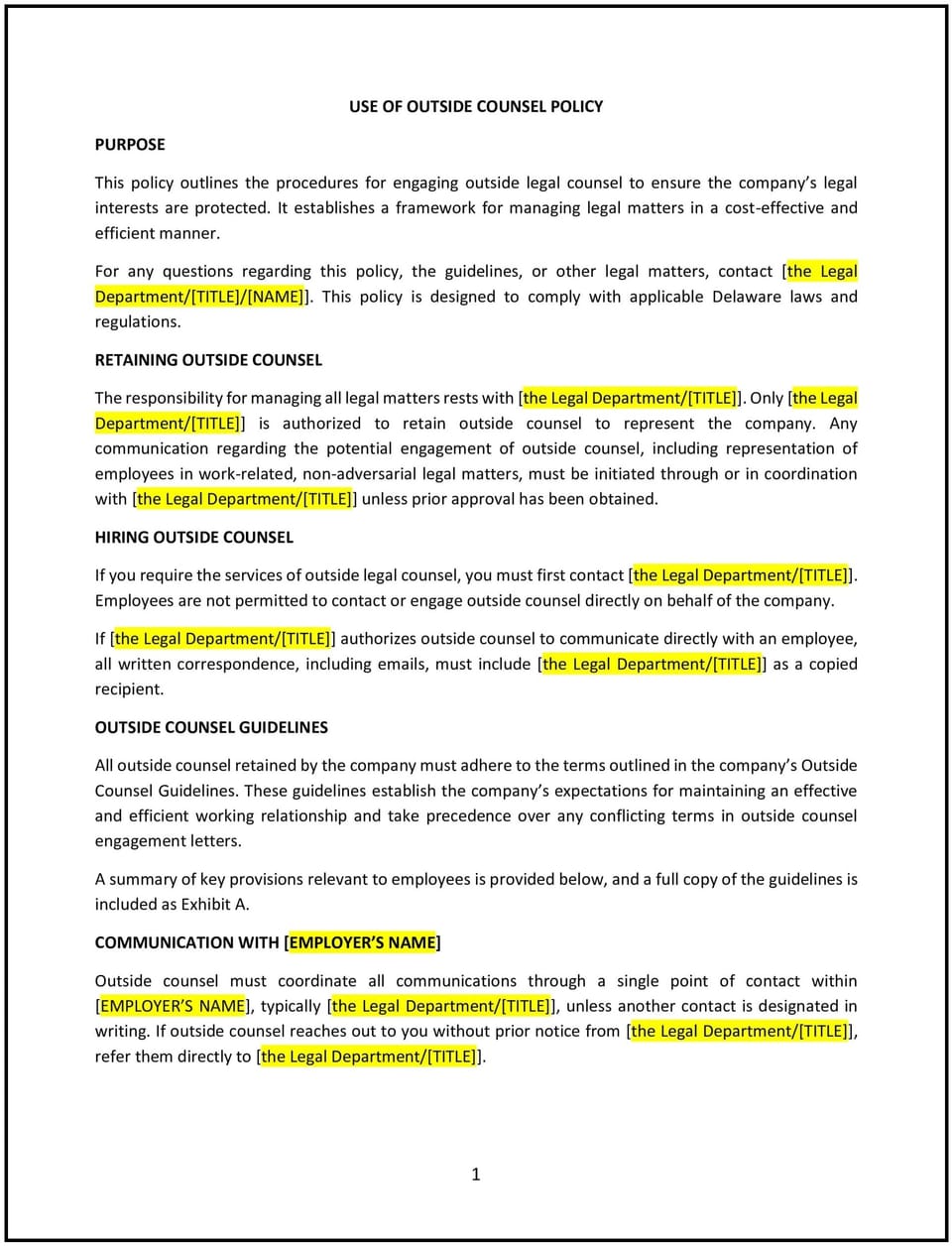Use of outside counsel policy (Delaware): Free template

Use of outside counsel policy (Delaware)
A use of outside counsel policy helps Delaware businesses define guidelines for engaging and managing external legal counsel. This policy ensures that legal services are utilized effectively, aligns with business goals, and establishes procedures for cost management, compliance, and performance evaluation.
By implementing this policy, businesses can streamline legal processes, control expenses, and ensure quality representation.
How to use this use of outside counsel policy (Delaware)
- Define when to engage outside counsel: Specify circumstances that require external legal expertise, such as litigation, regulatory compliance, or specialized advice.
- Establish approval procedures: Require management or board approval before engaging outside counsel to ensure alignment with company priorities.
- Set selection criteria: Provide guidelines for selecting outside counsel, considering expertise, reputation, and cost-effectiveness.
- Clarify billing practices: Outline acceptable billing arrangements, such as hourly rates, flat fees, or retainer agreements, and require itemized invoices for transparency.
- Monitor performance: Include procedures for evaluating outside counsel’s effectiveness and ensuring they meet expectations.
- Ensure confidentiality: Emphasize the importance of safeguarding privileged information and compliance with Delaware and federal laws.
Benefits of using this use of outside counsel policy (Delaware)
This policy offers several benefits for Delaware businesses:
- Optimizes legal spending: Controls costs by setting clear guidelines for when and how to engage external legal services.
- Ensures quality: Helps select experienced legal counsel suited to the company’s specific needs.
- Promotes transparency: Establishes clear billing and reporting expectations to prevent disputes.
- Enhances compliance: Aligns with Delaware laws and reduces risks associated with legal missteps.
- Improves efficiency: Streamlines the process of engaging and managing outside counsel, saving time and resources.
Tips for using this use of outside counsel policy (Delaware)
- Communicate the policy clearly: Ensure managers and employees involved in legal matters understand the procedures for engaging outside counsel.
- Create a preferred provider list: Develop a list of pre-approved law firms or attorneys based on expertise and cost-effectiveness to streamline selection.
- Track legal expenses: Use tools or systems to monitor spending on outside counsel and evaluate cost trends.
- Regularly review counsel performance: Schedule periodic evaluations to ensure outside counsel is meeting expectations and providing value.
- Update the policy as needed: Reflect changes in Delaware laws, company needs, or market conditions to maintain relevance and effectiveness.
Q: Why is a use of outside counsel policy important for my business?
A: This policy ensures effective use of external legal services, controls costs, and promotes transparency in engaging outside counsel.
Q: When should my business engage outside counsel?
A: Outside counsel should be engaged for complex legal matters, litigation, specialized advice, or situations where internal expertise is insufficient.
Q: How can my business manage legal costs effectively?
A: The policy outlines cost controls, such as requiring approval for engagements, negotiating billing arrangements, and monitoring itemized invoices.
Q: What criteria should businesses use to select outside counsel?
A: Selection criteria may include expertise in the relevant legal area, reputation, prior performance, and cost-effectiveness.
Q: How often should this policy be reviewed?
A: This policy should be reviewed annually or whenever Delaware laws, company needs, or market conditions regarding legal services change.
This article contains general legal information and does not contain legal advice. Cobrief is not a law firm or a substitute for an attorney or law firm. The law is complex and changes often. For legal advice, please ask a lawyer.


